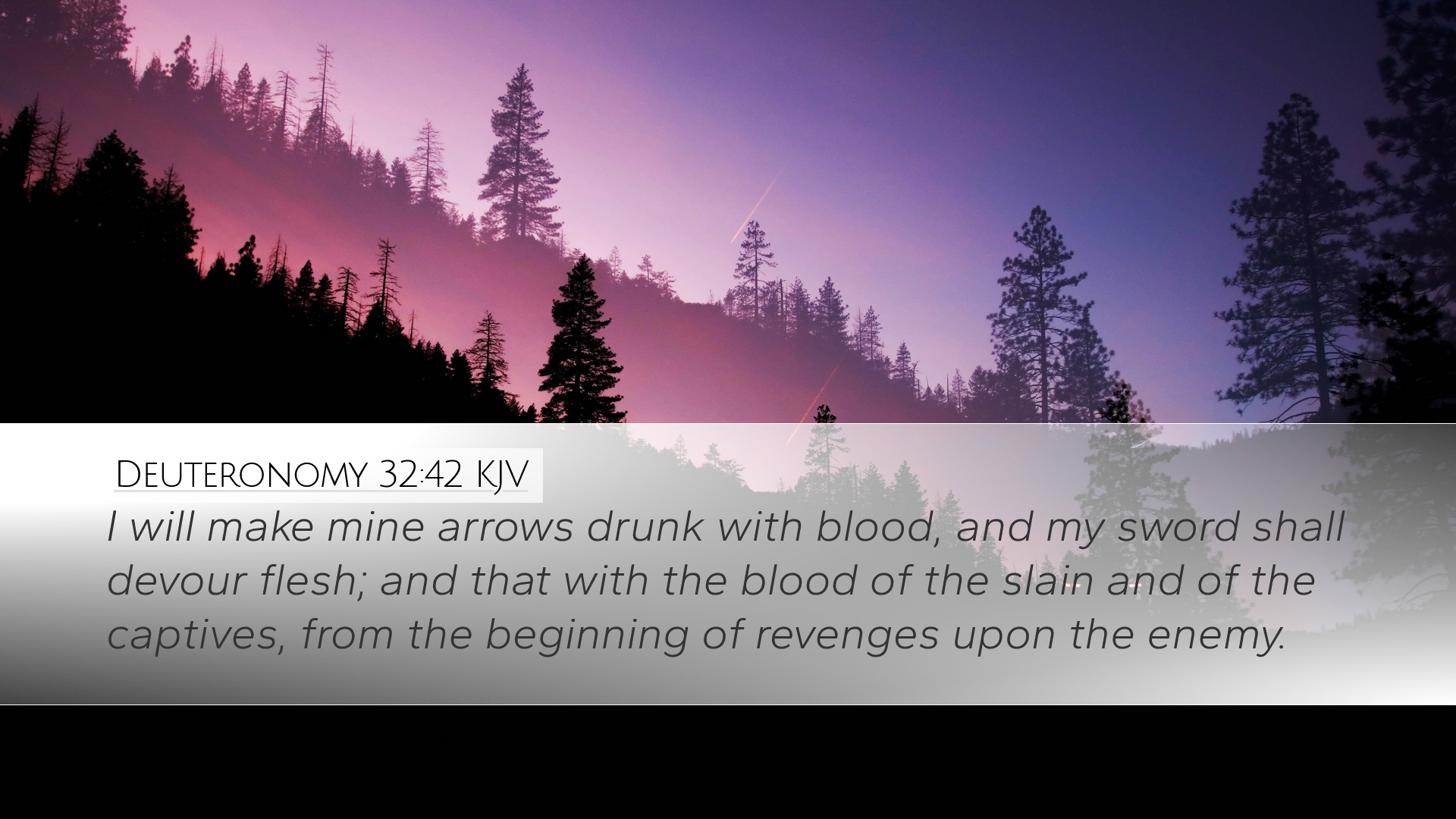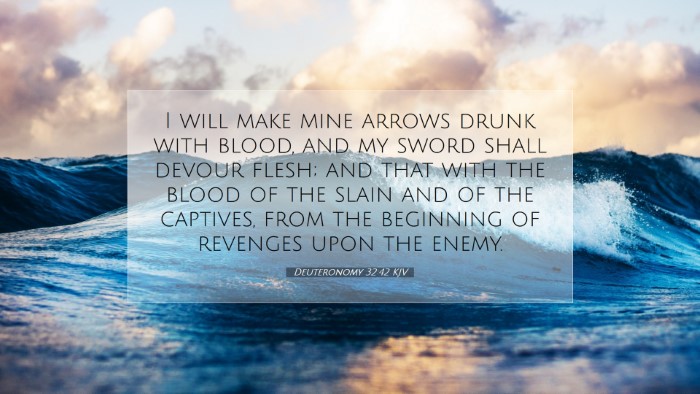Deuteronomy 32:42 Commentary
Verse Context: Deuteronomy 32:42 states, "I will make mine arrows drunk with blood, and my sword shall devour flesh; and that with the blood of the slain and of the captives, from the beginning of revenge upon the enemy." This passage comes from the Song of Moses, a prophetic poem that reflects on the history of Israel, God’s justice, and impending judgment on His adversaries.
General Overview
This verse serves as a striking representation of God's judgment against sin and enemies of His people. The imagery of arrows being "drunk with blood" emphasizes the intensity and finality of divine wrath. Through this powerful language, Moses conveys the certainty of God's justice in the face of oppression and rebellion.
Commentary Insights
Matthew Henry’s Commentary
Matthew Henry emphasizes the metaphorical language used in this verse, highlighting God's power over His adversaries. He notes that the arrows becoming "drunk with blood" signifies the overwhelming victory that God will achieve against Israel's foes. Henry elaborates that this imagery reflects God's judgment not just as a theme of punishment but also as a foundation for His covenant faithfulness to Israel.
Albert Barnes’ Notes
Albert Barnes provides a detailed exegesis of the text, noting that the "sword shall devour flesh" is emblematic of God’s decisive intervention on behalf of His people. He interprets the reference to “captives” as both a literal sense regarding warfare and a spiritual implication of redemption for those held captive by sin. Barnes argues that this passage instills a cautionary tale about the consequences of straying from God’s path.
Adam Clarke's Commentary
Adam Clarke approaches this text with an emphasis on the righteousness of God's judgment. He states that the "blood of the slain" signifies not just the reality of physical death but also spiritual desolation resulting from disobedience. Clarke notes that the phrase "from the beginning of revenge upon the enemy" implies the commencement of divine justice, theologically anchoring the idea that God’s righteousness prevails ultimately over evil.
Theological Implications
This verse speaks volumes regarding the nature of God as both a protector and a judge. It presents a dual perspective on divine justice: assurance for the oppressed and a stern warning to those who oppose God’s will.
The Assurance of Divine Justice
The certainty of God’s vengeance offers profound comfort to believers in times of despair and oppression. It serves as a reminder that while human injustices may prevail temporarily, divine justice is ultimate and often unforeseen. This truth is incredibly encouraging for pastoral care when addressing congregations experiencing conflict or persecution.
The Warning of Judgment
Conversely, the verse also warns against complacency and rebellion. The vivid imagery of blood and devouring flesh stirs deep reflection on the seriousness of divine justice. The pastors and theologians should communicate that God's justice is relentless against both external enemies and internal sinful habits, emphasizing the need for repentance and humility before God.
Application for Today’s Believers
- Reflect on Divine Justice: Believers are encouraged to find solace in the character of God as righteous and just. In struggles, they should trust that God sees all injustices and will act in His timing.
- Encourage Righteous Living: This verse can spur believers to examine their conduct, knowing that the call for holiness is both personal and communal. The consequences of defiance are stern reminders of the importance of living according to God’s Word.
- Foster a Spirit of Repentance: Understanding that God’s judgment is inevitable should lead to a fervent spirit of repentance, leading churches and individuals to seek cleansing and renewal in Christ.
Conclusion
In conclusion, Deuteronomy 32:42 is a powerful testament to the dual nature of God’s character as both a defender of His people and a judge of sin. Through the insights from Matthew Henry, Albert Barnes, and Adam Clarke, we are reminded of the balance of justice, offering both warning and comfort. May this verse encourage spiritual leaders and laypersons alike to uphold justice, seek righteousness, and trust in God's ultimate sovereignty over every situation.


